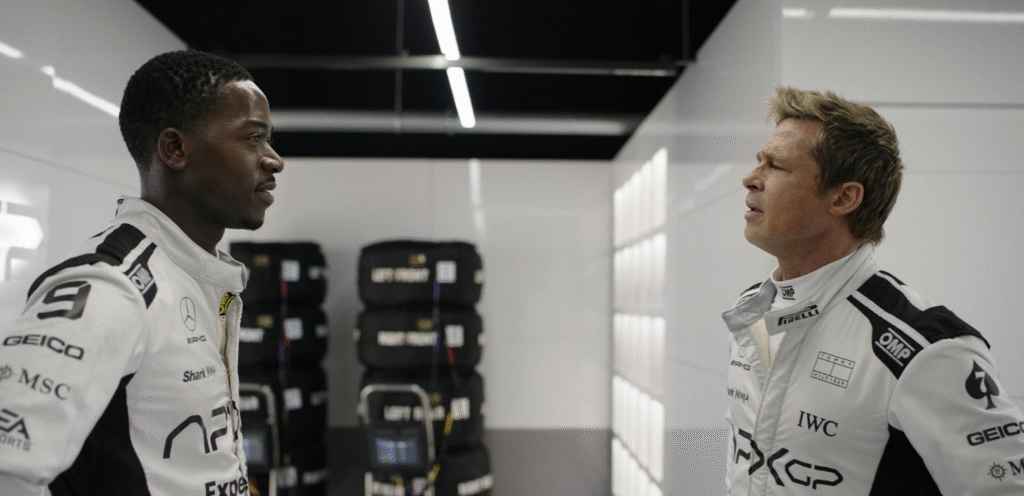The Other Side of the Mountain – memories that bind us across generations.
Yumeng He’s short documentary 'The Other Side of the Mountain' feels ...

Joseph Kosinski’s F1 arrives with the weight of expectation, the kind that anyone would expect from a film that is purported to have cost a whopping $250 million to make.
Pairing Brad Pitt with Damson Idris, Javier Bardem, and Kerry Condon, and backed by Apple Studios with the full blessing of Formula One and Mercedes-AMG, the film sets out to bring the roar of motorsport to the cinematic mainstream. It certainly has the sheen, the speed, and the adrenaline, but it leaves you wondering if there is much of a heartbeat underneath the glossy hood.
At the center of this story is Sonny Hayes (Brad Pitt), a man once destined to be a racing legend until a devastating accident cut his career short decades ago. Now older, weary, and living life on the fringes, he drifts from track to track chasing races more for the feeling than for the glory. When his former teammate, Rubén Cervantes (Javier Bardem), pleads with him to join his collapsing F1 team, Sonny reluctantly accepts only to discover he wasn’t even the first choice for the seat.

It’s a classic comeback setup story. The veteran returns to the stage he once dominated, but this time he must share the spotlight with a brash young rookie, Joshua Pearce (Damson Idris). The friction between the two is immediate. Pearce, intoxicated by ambition and the noise of celebrity, sees Hayes as a relic. Hayes, meanwhile, tries to navigate his own doubts while proving that experience still matters in a sport obsessed with youth. Their rivalry, framed against the team’s fight for survival, is the dramatic spine of the film.
On the track, F1 is as thrilling as you would hope. Kosinski has a talent for staging high-intensity sequences, and here he captures the blistering pace and danger of Formula One with cinematic flair. The roar of engines, the close calls, the precision of pit stops all of it lands with visceral impact. In those moments, when the cars are flying and the camera finds serenity in the chaos, the film hums with the energy it promises.
Off the track, however, the story struggles to find equal footing. Hayes is written as the archetypal loner scarred by his past, haunted by broken relationships, carrying lucky tokens and one-liners that feel more like movie shorthand than lived-in truths. Pitt, to his credit, wears the role with enough ease and charisma to keep us invested, but the script rarely gives him the chance to peel back the layers of a man who has lost so much. The same goes for Pearce, who moves from arrogance to discipline, but without much depth beyond the expected beats.
Kerry Condon, as Kate McKenna the team’s technical director and Hayes’ quiet romantic interest adds warmth and grounding. Her presence suggests another dimension to the story, one where resilience is not only about speed but about connection. Yet even here, the film holds back, as though afraid that tenderness might distract from the spectacle.

Perhaps that is the film’s biggest weakness: its reluctance to dig beneath the surface. For all its scale, star power, and meticulous authenticity (with Mercedes and F1 executives shaping much of the production), F1 never feels entirely free. It is as though every frame is calibrated to protect the brand rather than challenge it. The world of Formula One, with all its excesses, politics, and contradictions, remains untouched. What we get instead is a clean, sleek fantasy easy to consume, difficult to remember.
And yet, there is a part of me that admires what F1 manages to achieve. In an era where blockbuster cinema has grown repetitive and uninspired, this film at least dares to bring something different to the big screen: the romance of speed, the poetry of risk, and the allure of a sport that is as unforgiving as it is beautiful. It is not profound, and it is not groundbreaking, but it does give audiences two and a half hours of spectacle, anchored by Pitt’s magnetic presence.
F1 is ultimately a film that runs smoothly but feels too safe. It thrills in the moment, especially when engines scream and tires burn, but leaves behind little emotional residue once the credits roll. For those who come for the rush, it delivers. For those searching for depth, it may feel like an empty victory lap.

Leave A Reply